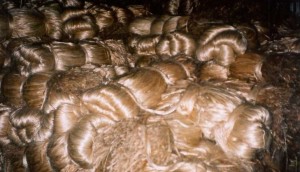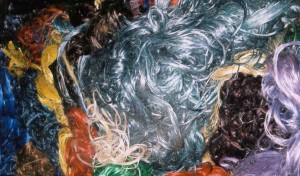 Interest is growing among the farmers of Chandpur in cultivating jute and at the same time the encouragement being noticed among jute traders , which demonstrates jute is getting back its past glory.
Interest is growing among the farmers of Chandpur in cultivating jute and at the same time the encouragement being noticed among jute traders , which demonstrates jute is getting back its past glory.
Jute has been cultivated widely this year at Matlab-Dhonagoda Irrigation project, eight upazilas under Chandpur irrigation project including Hajiganj, Kachua, and Shahrasti upazilas.
The farmers of the district have cultivated jute on 6,000 hectares of land as the environment for jute cultivation was conducive because they got seeds, fertilizers and pesticides timely. They brought 1,000 hectares more land under jute cultivation than that of the target of 5,000 hectares set by the Agriculture Extension Department of the district.
The farmers said production was also very good. All the processing work of jute meaning jute cutting, separating of jute from its plants, drying of jute and jute sticks are noticed on the side of all roads,  highways, embankment and the flood control embankments of the two irrigation projects in Chandpur district. But such a scene was almost absent even two or three years ago in the district.
highways, embankment and the flood control embankments of the two irrigation projects in Chandpur district. But such a scene was almost absent even two or three years ago in the district.
Jutes is being sold in all the markets in the rural areas of the district. The traders said they are selling one mound of jute at Taka between 1,200 and 1,400. But the prices of jute last year was at Taka 700 or 800.
Several farmers said they have cultivated jute on 270 decimal lands and their production was quite well and are selling jute at Taka 1,200 or 1,400. and a bundle of 20 jute stick is being sold at Tk 120.
Local jute traders said they buying a mound of jute at TK 1,100 or 1,400. They selling the jutes in different whole sale markets carrying them with trucks, tractors, mechanized boats, and cargo carriers.
Once Chandpur was called the second Dandy of Bangladesh. Besides three jute mills and 18 jute companies and four jute bailing companies were in Chandpur where 20 to 25 thousands workers were used to work daily.. Chandpur had to export 70,000 to 80,000 bails of jute to different places of the country every month.
As the Bangladesh government banned use of polythene and synthetic bags in the country and the  voice raised by scientists against the use of polythene bags as they were destroying the environment. The voice was raised across the world against use of the polythene bags for environmental reason, made the golden fiber popular and demand for jute grew across the country.
voice raised by scientists against the use of polythene bags as they were destroying the environment. The voice was raised across the world against use of the polythene bags for environmental reason, made the golden fiber popular and demand for jute grew across the country.
The current situation demonstrates that the golden fiber is gaining to its lost glory as the farmers are getting fair price of jute.
The present government of Prime Minister Sheikh Hasina is trying to reopen the shut jute mills of the country to rehabilitate the jute mill workers and create new job opportunities. Observers believe that if the government opt to revitalize the jute mills, then jute certainly would get back it lost glory across the country.
Source: The New Nation